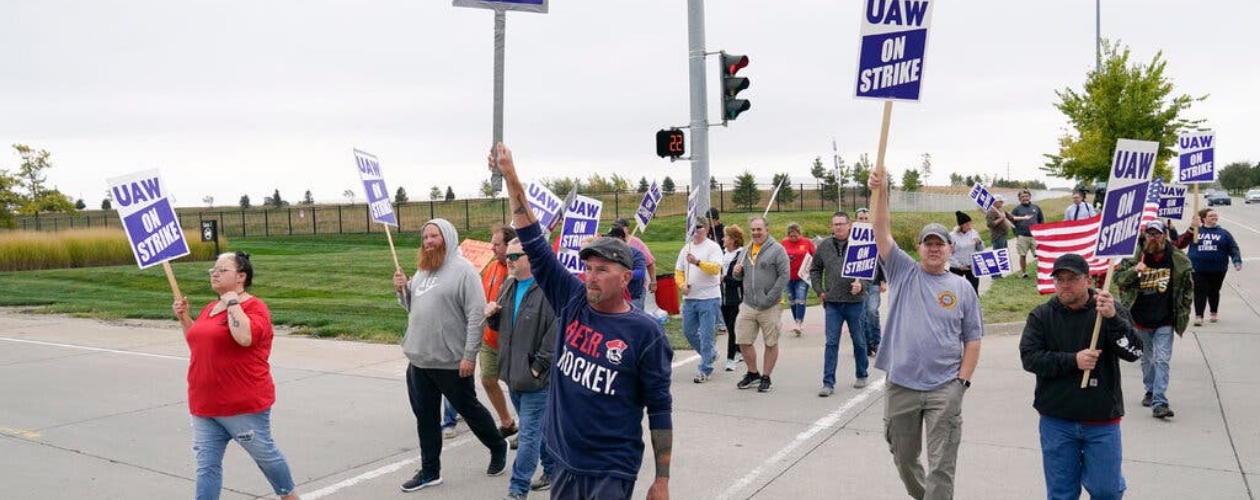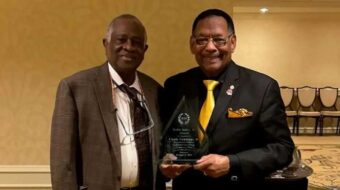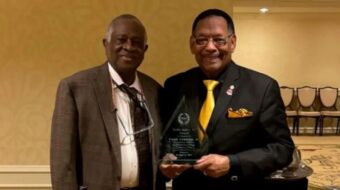
MOLINE, Ill.—By a 61%-39% margin, voting Auto Workers among the 10,100 John Deere employees who went out on strike on Oct. 14 approved a new six-year contract with the huge farm equipment maker. The Nov. 15 vote marked the union’s third try at getting members to OK a new pact.
In hailing the ratification, the union said the month-long strike “captured the mood of a nation in search of fairness in wages and benefits for workers.”
The key changes between the last contract the workers rejected, by 10 percentage points, and this one were enhanced retirement options and performance benefits, UAW reported. And cost-of-living increases, once a regular feature of UAW-bargained pacts, but absent in recent years, returned.
What is unclear is whether the two-tier wage system, imposed first at the Chrysler plant in Belvedere, Ill., in 2007, at GM later that year and subsequently at John Deere, plus the two other Detroit-based automakers, is gone.
Bloomberg Law reported it was “stripped out through rounds of aggressive bargaining” since then. Another Bloomberg article added: “There are no new tiers in the Deere deal.” And an agreement summary UAW distributed, which Bloomberg also posted, shows no second tier, at least for wages.
Deere’s own announcement doesn’t mention two tiers. It touts hourly pay raises of “$6-$9 hourly, depending on job classification.” It also publicizes the restored cost-of-living increases, adjusted every nine months. There is, however, a second tier on pensions, with workers hired starting in 1997 on that lower tier.
Labor Notes said the workers “proved you can still strike and win big.” Workers “killed a new tier, doubled their raises, improved their pensions and won back the COLA,” it added. UAW was unable to make available anyone to clarify details of the fate of the two-tier system.
Two-tier wage systems—along with lower-paid temps working at the same jobs as full-timers side-by-side—have been common, and divisive, employer devices for more than a decade. Bosses often use such tactics not just to cut costs and raise profits, but to pit worker against worker.
While two-tier wages may be gone at Deere, the relatively high “no” vote indicates some continued dissatisfaction with the pact. CNN reported workers who turned thumbs down did so because they believe John Deere, which forecast profits this year ranging from $5.7 billion-$5.9 billion, should have put more money on the table.
Basic terms remained unchanged from the second contract that the workers had rejected: An $8,500 signing bonus, a 20% pay hike, with half of that this year and 5% raises in years three and five, plus 3% lump sum payments in its other years. And Deere, not the workers, pays for health care premiums.
“UAW John Deere members did not just unite themselves, they seemed to unite the nation in a struggle for fairness in the workplace. We could not be more proud of these UAW members and their families,” union President Ray Curry said in a statement.
“Members’ courageous willingness to strike to attain a better standard of living and a more secure retirement resulted in a groundbreaking contract and sets a new standard” for both UAW’s other members and nationwide, predicted Chuck Browning, UAW’s Vice President for its Agricultural Implement department and its lead negotiator with Deere.
Browning attributed the contract to John Deere workers’ “sacrifice and solidarity” and bargainers’ determination, without mentioning that members, with that solidarity and sacrifice, had rejected two prior pacts—and bargainers’ own admission they had to re-canvass members after defeat #1.
National pundits echoed Curry’s comments the forced strike is a symbol of the nationwide struggle by workers for fairness on the job, in months that have seen a wave of strikes and several big last-minute settlements where workers have won.
But the strike and the prior rejections may also be a signal to UAW leaders, too. An independent caucus within the union, Unite All Workers For Democracy, had previously pointed that out.
UAW-D has been campaigning, hard, for members to change UAW’s method of electing its leaders—the president, other officers and the board—from a convention system with weighted votes from locals to direct one-member one-vote balloting.
Holding a referendum on such a change was one condition of the consent decree UAW signed with the Justice Department to basically end the government’s prior probe of a wide-ranging bribery scandal within the union.
The scandal saw what was then FiatChrysler bribing 12 top union officers, plus the wife of one of them, to influence bargaining. The 12, including two consecutive past UAW presidents, wound up pleading guilty and going to jail.
By Nov. 19, UAW members must ensure they’re in good standing, so they can vote on that change in how leaders are elected. Ballots must be returned by Nov. 29 for an independent monitor to count.
The union’s incumbent leadership opposes the one-member one-vote plan. Several other major national unions, including The News Guild, the Teamsters and the Laborers, hold such direct elections. Federal consent decrees covering the latter two unions mandated those votes.
The Teamsters are voting now on a new president to succeed the retiring Jim Hoffa, in a hotly contested campaign, including three face-to-face debates.
John Deere workers, for now, along with millions of their supporters across the country, have much to celebrate. They are only the latest members of the nation’s huge multi-racial working class to score a big victory over their bosses by mounting a united struggle.













Comments